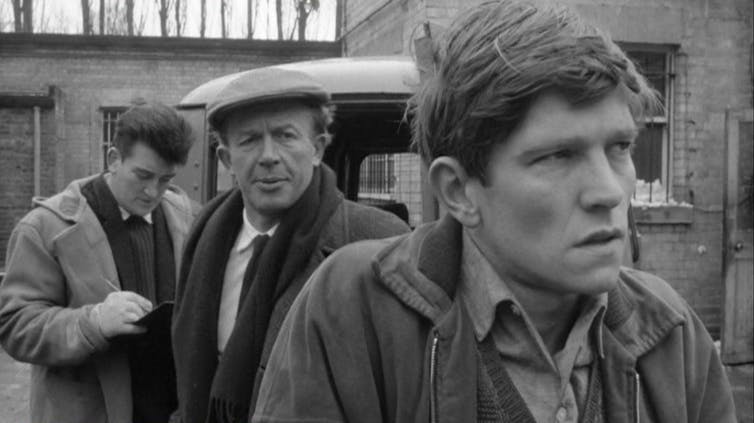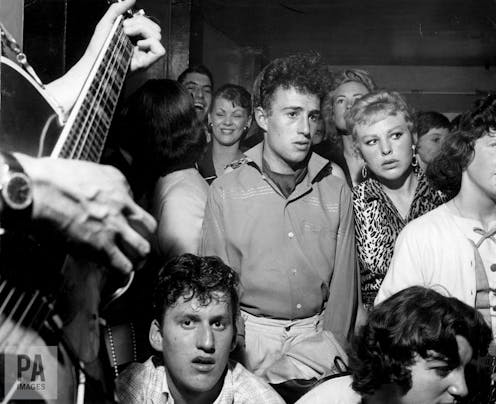Reflecting on his experience of teaching English in Malaysia during the build-up to independence in 1957, the author of A Clockwork Orange, Anthony Burgess, conceded in his autobiography Little Wilson and Big God:
We all had to yield to American culture, and my lessons would sometimes consist of a close examination of an item in Time magazine, briskly dealing with the new phenomenon of Elvis Presley or the Suez crisis as seen from an American angle.
This admission reveals the intertwined histories of British imperial decline, the post-war rise of popular culture and the realisation that America was to be the new giant of geopolitics.
Since 1956, the Suez Crisis has become much more than a political event that marked a definitive shift in geopolitical relations between Europe, America and the Middle East. It has come to symbolise the moment when the myth of European colonial superiority could no longer be sustained.
British responses to the end of empire and the rise of America in part expressed anxiety about the nation’s changing national and cultural identity. In John Osborne’s seminal play Look Back in Anger, which premiered just months before Suez, Jimmy Porter laments that there “aren’t any good, brave causes left” since his post-war generation could no longer invest in the “romantic picture” of Empire. As well as looking back, with a pointedly nostalgic view of British colonial expansion, Porter looks forward to the emergence of a “dreary” American Age where “all our children will be American”.
The cultural sociologist Richard Hoggart would give weight to Porter’s rather flippant prediction in his influential 1957 study The Uses of Literacy. Upon observing the teenagers – or “jukebox boys” – who populated the fashionable milk bars of suburban England, Hoggart remarked that their clothes, hairstyles and even their very facial expressions and postures, all indicated that they were “living to a large extent in a myth-world compounded of a few simple elements which they take to be those of American life”.
The concern expressed by both Osborne and Hoggart is palpable – American dominance will not merely be registered on the surface of British life but will transform future generations on a much deeper national and even psychological level.

End of Empire angst
Anxiety and nostalgia are a significant dimension of post-war responses to the Suez Crisis. Yet many writers of the era, such as Burgess, Alan Sillitoe and David Caute who had direct experience of decolonisation through national or colonial Service provide us with more. In a number of the “end of empire” novels published in the aftermath of Suez it is possible to read an awareness of the potential durability of imperial relations.
While still in many ways being compromised by an attachment to empire, Burgess’s Malayan Trilogy (1956-9) in particular evinces a concern with the power of mass culture to promote consumer capitalism and enable a shift in – rather than an end to – imperialism.
Burgess was stationed in Malaysia between 1954 and 1957, offering him a rather unique insight into the waning of British power, the fruition of Malaysian independence and the rise of American dominance. The emerging influence of America is alluded to in Time for a Tiger, Burgess’s 1956 debut and the first instalment of his trilogy. Discussing the possible appointment of an American headmaster at the school where the novel’s protagonist Victor Crabbe is working, it is argued that such a decision “would be a complete betrayal of the ideals on which the Mansor School was based” and would symbolise “surrender to a culture which, however inevitable its global spread, must for as long as possible meet a show of resistance”.
Facing the music
That resistance is revealed by the end of the trilogy to be virtually impossible when American influence is felt at the same time that Americans are notable by their absence. In Beds in the East, written in 1959, a jukebox – the primary marker of American cultural imperialism identified by Hoggart – is depicted as having reached Malaysia. It is installed in a shop owned by the father of the Chinese character Robert Loo, whom Crabbe has been instructing in the composition of classical music.
Robert is interrupted from writing his first concerto, which he hopes will celebrate “Merdeka” or Malay independence, by the unveiling of his father’s new purchase:
Soon it stood naked and shining in sunlight, stripped of its crude cerements, a portent and a god. “Ah”, breathed the crowd.
In this moment, the cultural and national comradeship from below, as represented by Robert’s symphony, is displaced by the deified commodity. It is not the actual music that inspires the awed response of the locals but the romanticised product associated with the lure of America.
The turmoil surrounding Suez can be seen as the moment when the reality of British imperial decline became impossible to avoid. Post-war literature offers us an insight into another national fear at the heart of this pivotal historical event: for both the colonies fighting for independence and for Britain, decolonisation meant subordination to a new American empire. And it was to have the power of Elvis and jukeboxes at its disposal.


